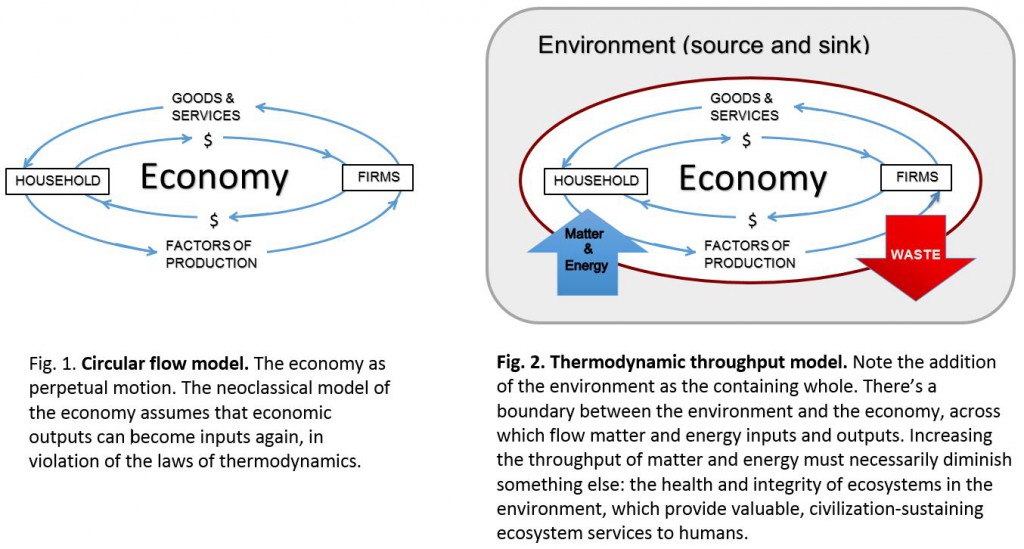The Future History Of Political Economy – Part 2
By Eric Zencey
12 June, 2015
The Daly News
Thermodynamics in Economics: Revolutionary portent, future history
Ecological Economics represents the extension into economics of the thermodynamic revolution of the nineteenth and twentieth centuries. In physics, that revolution dethroned Newton and brought relativity. In biology, it was midwife to the birth of ecology, the study of ecosystems as wholes in which energy networks—food webs—are a defining structure. In chemistry the laws of thermodynamics brought clarity and rigor to a science that struggled to bring theoretical unity to diverse phenomena. So far, though, most economists are perfectly willing to treat their subject matter as if the laws of thermodynamics simply don’t apply to it.

But the thermodynamic revolution in economics can’t be permanently forestalled. For one thing, it’s getting harder and harder for the neoclassical model to reassure us that its system of Newtonian abstractions is a good fit to the real world. The Great Collapse of 2008 demonstrated that whatever else it is, the discipline of economics isn’t very good at predicting major economic phenomena. Climate change and the Sixth Extinction make it hard for economics to maintain its pretense that economic activity takes place in abstractia, on the clean white pages of textbooks or on whiteboards holding formulae, with no roots in or consequences for anything outside of itself. Truths derived on the model of Newtonian mechanism are supposed to be abstract and ahistorical, but our planet and our economy are most assuredly evolving concretely and over time.
The driving dynamic of this economic and planetary change—the driver of history for the past three centuries—has been human use of high-EROI fossil fuel. The driving dynamic of the history yet to come will be the declining EROI of our civilization’s energy sources.
You can see some of the consequences of declining EROI already:
>> Despite a rising real per capita GDP, for a significant percentage of workers in OECD nations personal income has flatlined or is declining. An increasing concentration of income helps explain this but another dynamic is at work as well. As EROI falls, it takes more economic effort to get the energy that’s needed to support economic effort. Even as gross economic activity (GDP) grows, production of net benefit is shrinking.
>> Other sectors of the economy have been affected by this ongoing increase in the economy’s matter-and-energy overhead. “Austerity” has become the watchword for governmental budgets, even in the wealthiest nations in the world. Developed countries find it increasingly difficult if not impossible to pay maintenance and upgrade costs on infrastructure investments made in the heyday of 100-to-1 oil.
>> In its 2013 report card on America’s infrastructure, The American Society of Civil Engineers estimated that the U.S. needs to invest $3.6 trillion over seven years to restore and maintain existing infrastructure.
>> Worldwide, many of the ecosystems that support human civilization are degraded and close to collapse. Forced by both ideology and declining EROI into austerity budgeting, governments are reducing their scope and energy at the exact moment that sustainability would have them take strong action to rein in the rational, free-market tendency of corporations to maximize profits by degrading the commons and externalizing other costs.
>> Pension-fund wipeouts are becoming common as one way to fulfill the economy’s structural need for debt repudiation—a need that lies in our system’s willingness to let debt grow faster than a declining EROI economy can pay back, even after growth has been stimulated by lifting or reducing regulations that limit the environmental damage done by economic activity.
>> The planetary carbon sink is full, producing climatic effects that even an abstraction-inhabiting, arithmo-morphizing economist has to acknowledge as a troubling reality.
Centuries from now economic historians are likely to understand the relationship between EROI and wealth creation much better than does the average economist of today. I think it likely that future political economists will express wonder not at the 20th century’s enormous economic success, but at how little we actually added to our stock of wealth for all the high-EROI coal and oil it was our pleasure to burn. They are almost certain to shake their heads in wonder that we, enjoying an energy supply and an EROI never seen on the planet before or since, could ever have experienced an economic downturn, could ever have let a human starve from want, could ever have been so programmatically blind to the physical origins of our fortunes.
Eric Zencey is an American author. Zencey currently teaches for Empire State College in Prague and New York State. Zencey argues that the G.D.P. is a flawed measure of societal and economic progress and should be abandoned as a primary benchmark
Tags
.
Comments are moderated

